- Animal Testing
- Beef
- Chicken
- Circuses
- Dairy
- Dissection
- Donkeys
- Down
- Eggs
- Foie Gras
- Fur
- Honey
- Hunting
- Lobster
- Pork
- Seal Hunt
- Turkey
- Wool
- Zoos
Eggs

Chickens are among the most abused animals in our food industry. There are very few laws in place that protect them. Chickens exploited for their eggs are called "layers".
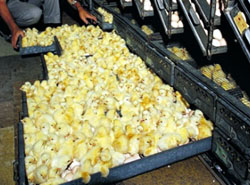
Being Born in the Egg Industry
Chickens usually start out their life being born inside drawers of huge incubators at a hatchery.
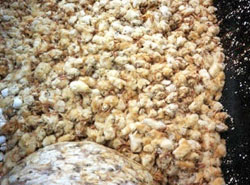
Male Chicks
After being born, they are sorted. Male chicks are considered useless in the egg industry, since they come from selective egg-laying strains, which are not suitable for meat production. They are discarded by being gassed, ground up alive or thrown into plastic bags or dumpsters.
One research scientist observed chicks being ground up and said that "even after twenty seconds, there were only partly damaged animals with whole skulls". With their skulls still intact, they were fully conscious and left to die a slow and agonizing death. Other eyewitnesses have told similar stories of chicks being slowly dismembered by machinery blades.
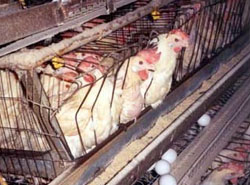
Hens in battery cages
The great majority of all "layers" are kept in battery cages. Usually 5 hens have to share a cage measuring 18 by 20 inches. Their living conditions are so stressful that their laying span lasts only about 1-2 years instead of the normal 15-20 years.
When her egg laying rate drops, she is considered "spent". "Spent" hens are either killed or force molted. Force molting involves being kept in complete darkness without food or water to shock their systems into another egg laying cycle.
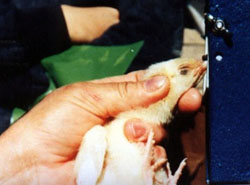
"Debeaking"
Being confined to an overcrowded cage also causes excessive pecking. To avoid the hens from injuring each other, they are "debeaked", which means that part of their beaks are cut off.
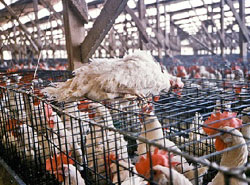
Bone Fractures
Hens in battery cages are unable to exercise. Since laying eggs also takes a lot of calcium out of their bodies, they have weak and brittle bones and often suffer fractures. This causes them a lot of additional pain and distress.
Bone factures also occur frequently when the hens are removed from their cages and transported for slaughter.
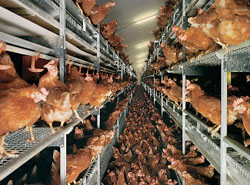
"Free-Range" Eggs
Some people switch to "free-range" eggs when they find out about battery cages and don't want to support that industry. "Free-range" however, does not mean that the chickens are treated well. Generally "free-range" means that the animals are not kept in cages. They are however, commonly confined indoors, sometimes in very crowded conditions. Practices like "debeaking" and force molting can also be found on "free-range" farms.
Just like any other industry, "free-range" farms have to make a profit. Male chicks are still useless and discarded. Another problem chicken farmers deal with is the transportation of eggs. Since eggs are usually transported by trucks, egg farmers need their eggs to have a certain firmness. Chickens start to lay less firm eggs after about one to two years at which point they are usually slaughtered.
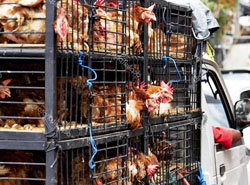
Spent Hens at the Slaughterhouse
When the layer hens reach the slaughterhouse, they are removed from their crates and hung upside down by their feet while fully conscious. First their heads will be dragged through a bath of electrically charged water, rendering most of them unconscious. They are then taken to an automatic neck cutter, where they are bled. After that they go to a scalding tank, which makes it easier to pluck them.
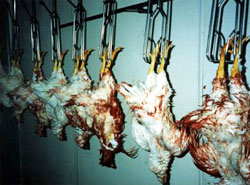
Some chickens are still fully conscious after the electrical bath, especially when the slaughterhouse doesn't use a sufficient stunning current. When their necks are cut, they don't always cut both carotid arteries, which are the major blood supplies to the brain. This means that there are still chickens who are fully conscious when they enter the scalding tank.

